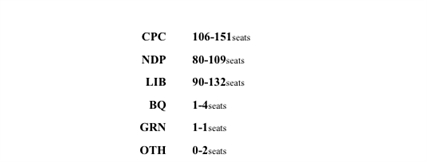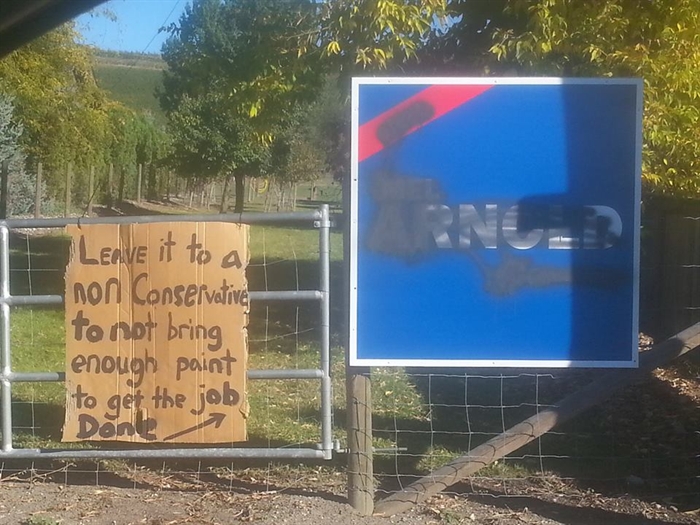
Image Credit: Contributed by author
October 06, 2015 - 8:12 AM
'BY CONTRAST TO THE LIBERALS AND THE NDP, THE CONSERVATIVES ARE LOOKING PRETTY GOOD TO CANADIANS.'
Back in June I wrote about the split on the left, how it was the mirror image of the split in the right that existed back in the 90s, and why that meant a Conservative victory on October 19. To all appearances it seems to be coming true today. As of this writing the Conservatives not only have a significant seat lead over the other two parties, but momentum is on the Conservative side while the Liberals are stagnant and the NDP are declining.
This leaves the Conservatives the only party within striking distance of a majority government.

Image Credit: CBC Poll Tracker, 5 Oct 2015
The Conservative position in the polls has to do with the split on the left to be sure, but that's a high level dynamic that could and would have been mitigated if one of the parties on the left had advanced ahead of the other to any real degree. In order to explain the immediate causes of the Conservative rise, we have to look a little deeper at the dynamics of the late election period. As Dimitri Pantazopoulos pointed out on CBC's "Power and Politics", the average citizen tends to engage by degrees as the election nears, so trends in polling matter more now, in this late period, than they did much earlier. So why the Conservative rise?
Paul Wells, writing in Maclean's, speaks for many pundits when he says he believes the Conservative bolt ahead is a result of the niqab issue and the Conservatives' prudent stance on accepting screened migrants. But while the Conservative position on the niqab has clearly struck a chord with mainstream Canadians, who have equally as clearly rejected the open-door immigration policy of both leftwing parties, I don't believe Canadians are as easily swayed by flashy issues as most pundits seem to believe. It seems to me there are other factors at work.
First, there's the 'guns-in-the-street' problem, recalling the Liberal ad that lost them the election in 2006 by leaping over the believability line too far into full blown Harper Derangement Syndrome (HDS). Both the Liberals and the NDP have continued the HDS tradition for the last decade, offering hysterical shrieks over each and every initiative the Conservatives have introduced, beginning back in 2006 when the unrealistic Kyoto accord, signed by the Liberals for optics rather than substance, was replaced by the more realistic Clean Air Act. More recently, the Navigation Protection Act (NPA), FIPA, Bill C-24, Bill C-51, and finally the Syrian migrant issue sent both the Liberals and the NDP into hair-tearing swoons of agony over what they claim is the alternately heartless, sinister, or anti-environment nature of the Conservatives. Most recently the Trans-Pacific Partnership trade deal signed by the Conservatives, creating the largest trading bloc in the world, predictably set both the NDP and Liberals and their union supporters howling about the imminent demise of Canada.
Canadians aren't buying it. Not only have the opposition parties cried wolf too many times, but the half-truths and outright lies they are throwing out have become so unbelievable that they now form mere background noise. For those of us aflutter over CO2 emissions, the Conservative government has reduced greenhouse gas emissions from 749 to 726 metric tonnes (Mt), compared to the previous Liberal government's (Kyoto) increase from 600 to 749 (Mt). The Navigation Protection Act simply scaled back federal involvement to those bodies of water that are constitutionally under federal protection. Both provincial and municipal regulations still apply to all the others. It was essentially a minor housekeeping issue that the left wing parties blew up into a false bogeyman. Canadians apparently disagree with the Liberals and the NDP about both Bill C 24 and C 51 - most generally seem to like the idea of terrorists losing citizenship and even the opposition parties have given up waiting for the slightest anecdotal evidence of a single "environmental protester" being harassed in any way by the exercise of C-51. In point of fact, the issue of C-51 died in the Munk debates with Harper's observation that "the threat we face is not CSIS, it's ISIS."
Second, there's the Liberal/NDP economics problem. The Liberals' understanding of economics can be dealt with by reference to two single sentences by Justin: "The budget will balance itself," and, more recently, "deficits are a way of measuring the kind of growth and the kind of success that government is actually able to create." Neither one makes the slightest bit of sense, and are representative of Trudeau's complete mystification over deficits, surpluses, budgets, and the economy in general.
The NDP, never having been a serious contender for power, has evolved past Alexa Mcdonough's monotonous chants of "American style healthcare," but still hasn't figured out how to campaign on the economy from the centre, so it simply shoved every socialist shibboleth it can think of into its platform. At last count it had made over $13 billion worth of promises it can't possibly keep while at the same time insisting, ludicrously, that it will deliver a balanced budget. Last week's barn-burner was an unfunded promise to do away with student loan interest; stay tuned next week when Mulcair channels Huey Long's "a chicken in every pot" and promises a Tesla in every driveway.
On top of all this the NDP shares Liberal confusion over basic economic concepts. Just one example is its claim that corporations are holding "dead money" and not "investing" it in the economy. Dead money is money that does not work, money that is outside the economy, producing no wealth. The problem with the NDP's dead-money thesis is that the corporate money the NDP wants to tax isn't dead. It's in the bank, where it is lent out as working capital along with all the rest of the money the bank holds. If the NDP confiscates it as it claims it will, that capital truly WILL be dead, sitting in the coffers of government until it's absorbed into the massive bureaucracy the NDP is promising to create. One can only hope that NDP economists someday figure out that we no longer live in a 10th century economy in which gold is stored in merchants' mattresses where it is truly dead.
Third, the gods have been favourable to Harper. While the Liberals and the NDP have gnashed their teeth and blamed Harper for every blip on the economic horizon, Canada has been doing fairly well overall in spite of the virtual collapse of the global economy in 2007. According to the Conference Board of Canada, Canada’s ranking has "improved to 6th place in the 2012 version of the Economy report card, up from 11th in 2008." Things began to look hopeful for the opposition parties for a while earlier this year when the economy stumbled into recession for a moment but, much to their chagrin, according to Statistics Canada the economy is now back on track and stronger than ever.
And this tendency goes beyond the economy, with good news rolling in from various organizations across the globe. In April Canada took 6th place of 133 countries, the highest of any G7 nation, in an annual “social progress index” developed by Harvard economics professor Michael Porter. The 2015 report from the Reputation Institute ranked Canada as the most reputable country in the world, based on a variety of environmental, political, and economic factors, and recently Canada moved up two points to 13th position in the latest Global Competitiveness Report issued by the Geneva-based World Economic Forum. Against this backdrop of international kudos, it's hard for the opposition parties to substantiate their claims that Canada has lost all respect and is an economic basket case. They actually look foolish trying to do so.
Fourth is the profound unseriousness of the opposition parties. One could, and no doubt someone will, write a book detailing the legions of frankly stupid things young Justin has blurted out over the past few months, and I've repeated a small number of them here and elsewhere, but there's one more I have to mention. Justin's defining moment was when the moderator of the foreign policy Munk debate asked him: "If you become prime minister, how would you deal with Vladimir Putin?" and the audience laughed. Everyone understands why the audience laughed, but less noticed are Justin's next words:
"[Putin] is pushing in blocking the achievement of ceasefires and stabilizing and stopping the bombings and war in Syria." Here's Justin Ling's take on that sage utterance: "Read that a few times. Putin is pushing in blocking the achievement of ceasefires. Putin is stabilizing and stopping the bombings and war in Syria. Putin is stop go stovepot fireplace and the train in Constantinople." Justin Trudeau reeks of amateurism, sans credentials, sans intelligence, sans seriousness. And he babbles inanities on a regular basis, like a first year university student using terms he doesn't understand but that sound all polysyllabic and jargony and cool when he says them.
The NDP is in a dicey spot. Having spent decades as an anchor party on the left with no hope of forming government, it has never developed the gravitas to be a serious contender for government. Mulcair has tried to tack to the centre, with marginal success, but he faces a problem, perhaps an insurmountable problem: while he's trying to act the moderate elder statesman, the rest of his party is still a far-left fringe party. While he tries to formulate a grownup energy policy, his candidates muse about shutting down the oil sands. While he tries to portray economic maturity, the heart of his party puts out "Manifesto for a Socialist Canada" and the so-called "Leap Manifesto", both radical, adolescent, almost communistic plans for Canada. While he tries to convince Canadians that he is a serious man in control of a serious party, his acolytes and candidates prance around conducting marginally musical "Harperman" temper tantrums full of slanderous silliness, and defacing public property. These are not the type of people Canadians want running things.

The Conservative sign displayed in Vernon resident Chris Van der Molen's yard was vandalized sometime overnight on Saturday, Oct. 3. His response wasn't to take it down, but to put up his own message.
Image Credit: Contributed
Finally, and I expect this is the most important reason for the Conservative advance, the dismal performance of the provincial NDP and Liberal parties has to be scaring Canadians away in droves. NDP provincial governments in Manitoba, Saskatchewan, British Columbia, and now Alberta have atrocious records of overspending, overtaxing, and generally wrecking the economies of those provinces. They have yet to learn that overtaxing corporations and mandating wage increases hurt the middle class and poor disproportionately for the simple reason that corporations simply pass on the loss to consumers in the form of consumer goods cost hikes and fewer jobs. The federal Liberals, for their part, have cozied up to Wynne's provincial Liberals in Ontario...who have managed to make the former economic powerhouse of Canada into a have-not province and the world’s most indebted sub-sovereign borrower, with double the debt of even famously debt-ridden California. Dragging this baggage behind them is about as endearing to the electorate as the sound of leper bells.
By contrast to the Liberals and the NDP, the Conservatives are looking pretty good to Canadians, even those who buy into some of the hysterical accusations from the left. The Conservatives have done what they said they'd do when they were elected last election, and promise to keep doing more of the same if they're elected again. That hasn't turned out too badly, overall, in the estimation of a lot of folks. "Change" may be alluring as a general proposition, but Canadians are smart enough to know that changing from the frying pan into the fire isn't an improvement by any measuring stick. None of that will stop the hysteria from the left of course...in fact, look for it to gear up to high decibel levels as the election gets closer. Why, just yesterday anti-Conservative Danny Williams, former Newfoundland and Labrador premier and long-standing sufferer of ankle biting Harper Derangement Syndrome, raised the pitch another level by implying that Harper is "borderline racist." Ah, silly season is here with a vengeance. Good times.
— Scott Anderson is a Vernon City Councillor, freelance writer, commissioned officer in the Canadian Forces Reserves and a bunch of other stuff. His academic background is in International Relations, Strategic Studies, Philosophy, and poking progressives with rhetorical sticks until they explode.
News from © iNFOnews, 2015